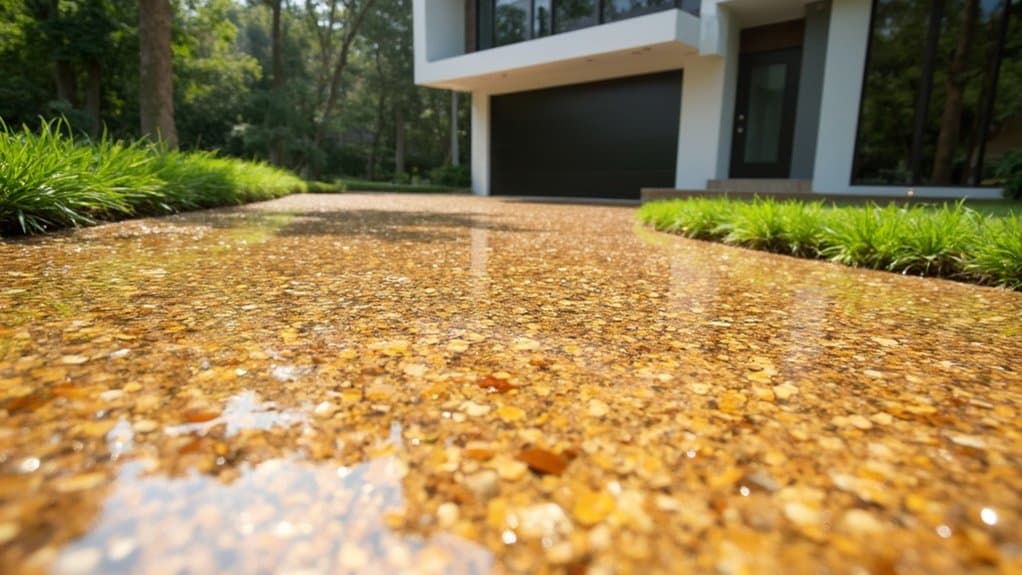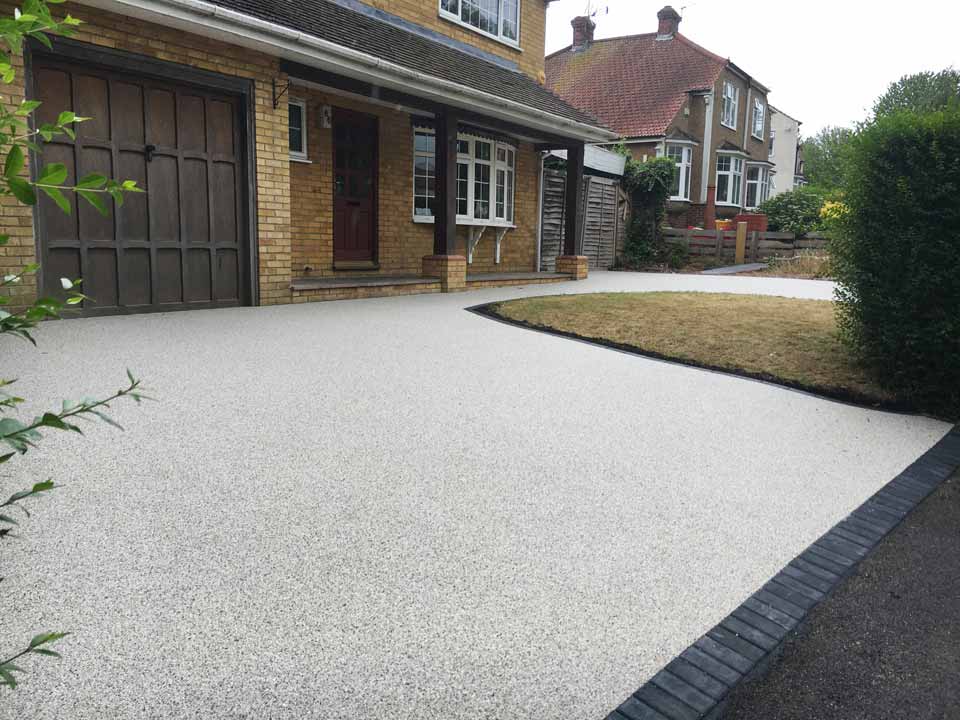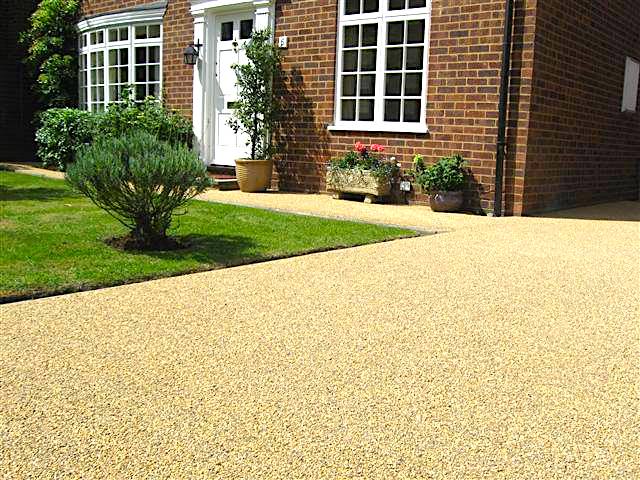Resin driveways offer a robust and attractive solution for your home. There are three types to consider: polyurethane, epoxy, and aliphatic polyurethane. The installation process is straightforward and includes preparing the base, laying the materials, and applying the resin evenly. Maintenance is minimal—just occasional cleaning and repairing any cracks. One of the benefits of resin driveways is their permeability, which aids in drainage and promotes sustainability. If you’re interested in costs and investment options, there’s plenty more to discover.
Table of Contents
ToggleKey Takeaways
- Select the appropriate resin type: use polyurethane for flexibility and UV stability, epoxy for indoor applications, or aliphatic polyurethane for its non-yellowing properties.
- Proper installation is essential; ensure a solid base, suitable edging, and even application of resin for maximum durability and performance.
- Maintain your driveway regularly by cleaning it, promptly repairing any cracks, and sealing every 3 to 5 years to prolong its lifespan.
- Resin driveways are permeable, allowing rainwater to drain effectively and reducing the risk of flooding, while also complying with SUDs regulations for stormwater management.
- Costs typically range from £11 to £17 per square foot, with extra fees for premium materials and custom designs. However, they require minimal long-term maintenance.
Types of Resin Driveways
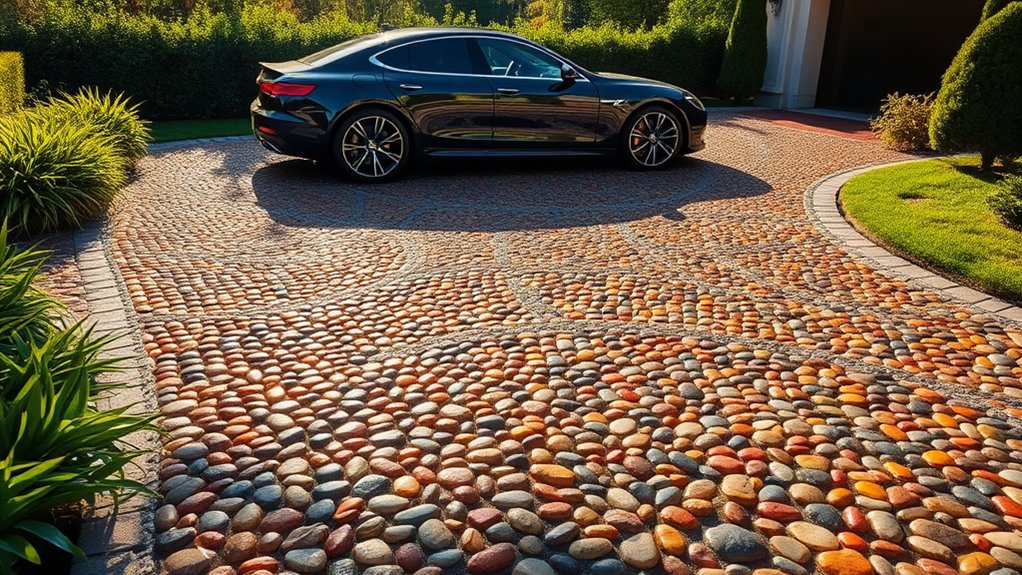
When considering resin driveways, you have three main types to choose from: polyurethane, epoxy, and aliphatic polyurethane.
Polyurethane resin is flexible and UV stable, making it ideal for outdoor use. Additionally, this type of resin offers a highly permeable surface, which can effectively manage rainwater and support Sustainable Urban Drainage Systems (SUDS). Epoxy resin, while less common for driveways, is mostly suited for indoor applications because it lacks UV resistance. Aliphatic polyurethane is notable for its non-yellowing properties and colour retention, ensuring your driveway looks good for longer. Each resin type offers various aesthetic options, allowing you to personalise your driveway with different aggregate sizes and colours. This versatility is enhanced by the fact that polyurethane resin is known for its durability for high traffic, making it suitable for both residential and commercial use.
Whether you prefer a smooth or textured finish, you can create a unique look that complements your home and garden.
Installation Steps

Installing a resin driveway involves several essential steps to ensure a durable and attractive finish.
Begin by preparing the area: assess the base for strength and clear away dust, weeds, and debris. If you’re applying the resin over concrete, use a primer to improve adhesion and ensure that the surface meets resin bound system standards for optimal results.
Next, excavate to a depth of 220mm and lay down a MOT Type 3 hardcore base. Ensure concrete/tarmac base is strong enough for intended use is critical to prevent future issues.
For edging, choose sturdy materials that will outline the driveway’s perimeter. Secure the edging to prevent any movement during installation and check for proper drainage capabilities to avoid water accumulation.
Mix the resin components thoroughly with the appropriate aggregate ratio, then apply the resin-aggregate mix evenly.
Use trowels to achieve a smooth finish and allow sufficient curing time before using the driveway.
Maintenance Requirements
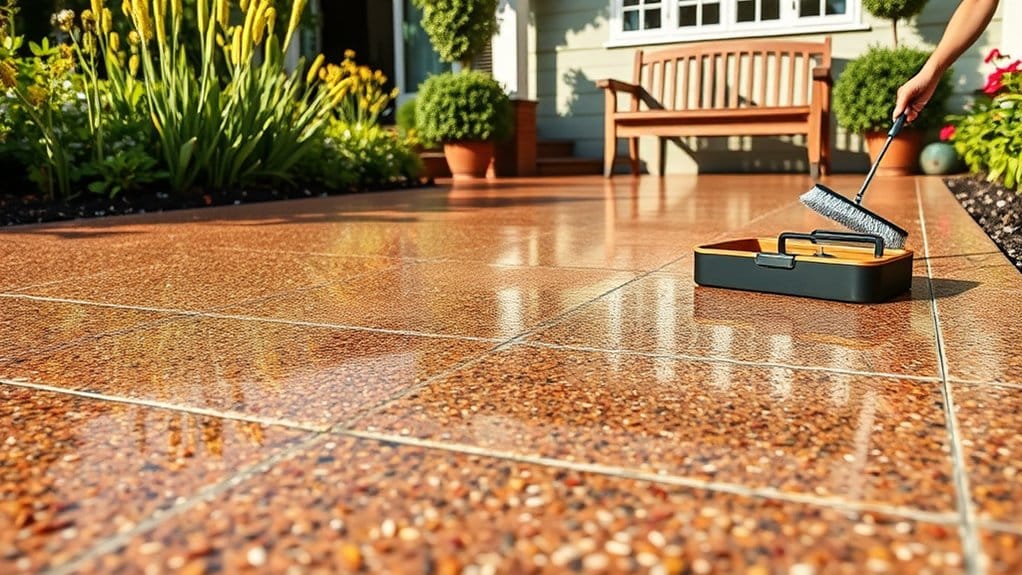
To keep your resin driveway looking its best and ensure it lasts, regular maintenance is key.
Start with simple cleaning methods like sweeping and hosing down to remove debris and prevent stains. If you notice any oil or chemical marks, deal with them quickly using appropriate cleaners. Regularly check for cracks and repair them early to avoid larger problems down the line, as prompt repairs are crucial to maintain the driveway’s integrity. Proper maintenance practices, including routine inspections, can help identify small issues before they escalate into costly repairs.
Every 3 to 5 years, apply a protective sealant to boost durability and protect against UV damage.
Seasonal care matters too—use non-corrosive de-icers in winter and inspect for wear after summer.
Permeability and Drainage

A resin driveway can greatly enhance your home’s curb appeal, but it’s important to understand permeability and drainage for its long-term performance.
The permeable nature of resin driveways allows rainwater to pass through, which helps prevent flooding and reduces soil erosion beneath. This stability meets the Sustainable Urban Drainage Systems (SUDs) regulations, which are essential for effective stormwater management.
Moreover, these driveways help filter out pollutants, leading to cleaner groundwater and less pollution in nearby water bodies.
To ensure optimal drainage, proper sub-base preparation is crucial. Consider adding permeable membranes and drainage systems, such as Aco and linear drains.
This way, you’ll have a durable, eco-friendly driveway that combines both beauty and practicality.
Cost and Investment
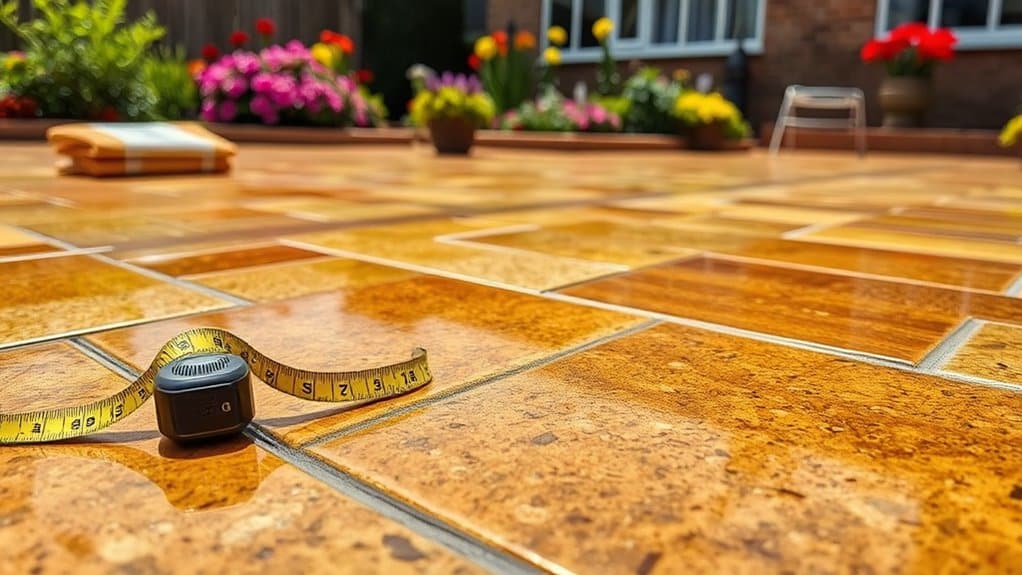
Understanding the costs of resin driveways is crucial for making a sound investment. Generally, you can expect to pay between £11 and £17 per square foot for materials, in addition to installation fees, which can vary depending on the size and complexity of the project.
Be mindful of your budget when choosing aggregates and custom designs, as premium options can add an extra £2 to £6 per square foot.
While resin driveways may come with a higher initial cost than concrete, they offer significant long-term benefits, such as low maintenance and durability.
Investing in professional installation and quality materials can help minimise future expenses. Remember, making informed choices now can lead to substantial savings later, making your resin driveway a wise investment.
Frequently Asked Questions
How Long Does a Resin Driveway Typically Last?
A resin driveway typically lasts between 15 to 25 years if installed and maintained properly. To maximise its lifespan, make sure to clean it regularly, reseal every 3-5 years, and steer clear of harsh chemicals. This way, you can enjoy a durable and attractive surface for years to come.
Can I Install a Resin Driveway in Winter?
Yes, you can install a resin driveway in winter, but there are a few important factors to consider. Make sure the ground is warm enough and free from moisture. Using specially formulated materials and enlisting professional help can significantly improve the chances of a successful installation during the colder months.
What Colors and Styles Are Available for Resin Driveways?
Envision your home with a stylish anthracite resin driveway. You can choose from a range of vibrant colours, such as blues and natural tones, along with various design patterns, including geometric shapes and blended styles. These options can significantly enhance your property’s appeal and curbside charm.
Are Resin Driveways Slippery When Wet?
Yes, resin driveways can be slippery when wet, much like other smooth surfaces. To enhance safety, consider adding anti-slip aggregates during installation and ensure regular maintenance to maintain good traction in all weather conditions.
Can I Park Heavy Vehicles on a Resin Driveway?
Parking heavy vehicles on a resin driveway isn’t advisable without checking for compatibility. To avoid damage and ensure durability, consider reinforcing the base and using proper weight distribution techniques. For instance, if you’re thinking of parking a delivery van or a 4×4, make sure the driveway can handle the weight, or you could end up with cracks or sagging over time.
Conclusion
In summary, resin driveways combine aesthetic appeal and practicality. To achieve a beautiful entrance to your home, it’s important to know the different types available, follow proper installation steps, and maintain your driveway. Remember that permeability and drainage are crucial for its longevity, and consider the costs in relation to your investment. With the right information, you can create a stylish and durable driveway that boosts your property’s appeal.
Whilst it is true that there are certain conditions required in order to lay a resin bound stone patio, pathway Read more
If your driveway is looking old and tired, a new one can help revamp your property. Modern driveways are available Read more
APPROVED RESIN BOUND DRIVEWAY INSTALLERS LOCAL TO YOU! Find out More Get in Touch Get a Free Quote Book an Read more

